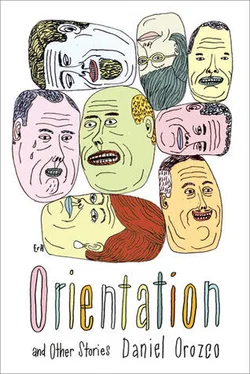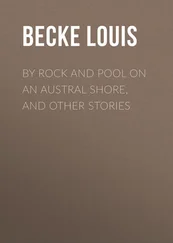He strolls across the patio, then stops short. Something flits into the edge of his vision, and he turns. He spots it, hovering, then alighting upon the ground. He approaches. It is some kind of insect, a big one. Thin, translucent wings spanning half a foot shimmer and iridesce in morning light. Perpendicular to these, a thorax over seven inches long inscribes in the air a slender and delicate arc of the deepest red — the red of arterial blood, of crème de cassis and rubies and the juice of roasted meat. It is a helicopter damselfly, the rarest of the order Odonata in all the world, and far from its range in southwest Brazil. The Presidente-in-Exile would not know this. He bends down, eyes narrowed. “What the fuck,” he mutters, for he has never in his life seen anything like it. He peers intently, seemingly making a study of this rare and exquisite creature — a trembling scarlet wound against the gray slate tiles. He pivots his left foot and moves the thin leather sole of his bespoke shoe centimeters above it. He taps. There is a sound like a burst of static, and the insect is squashed like a bug. The Presidente-in-Exile proceeds across the patio, dragging his foot once to scrape off the gore. He cuts through the west garden, along a flagstone pathway that circles toward the front of the villa. Behind him, the discarded pages of his newspaper trip and tumble across the grounds in a zephyr that has come from nowhere on this still and windless day.
In the courtyard, Gallardo has moved the Mercedes out from under the tree. The Mercedes is an armored vehicle custom-equipped with hardened steel body panels, 1.5-inch-thick windows of polycarbonate ballistic glass, and Kevlar-lined gas tanks. Gallardo has just finished the washing, and the car glistens all dewy in the light. He is struggling with the water hose, trying to coil it without getting his dress shirt dirty. Ten yards away, outside the gate, on Avenida España, a red Datsun blocks the driveway to the villa. Three men loll on the car, smoking cigarettes. They call to Gallardo: “Maricón, chuparosa, marica chingada.” They blow him kisses. They tell him they have hoses for him to handle, if he wishes. These men are the Paraguayan bodyguards assigned by Stroessner to protect the Nation’s Esteemed Guest. Gallardo snaps his wrist, flicks his finger, fires his cigarette butt. It traces an arc through the bars of the gate and lands in a burst of embers on the chest of the biggest guard. Direct hit. Beautiful. The guard leaps off the Datsun, curses, rushes the gate. But what can he do? Gallardo smiles, turns around, and waggles his ass. The guard reaches down and grabs his crotch. A piercing high-pitched whistle disrupts their pas de deux. From the pathway into the gardens, the Presidente-in-Exile is waving his folded paper impatiently: Let’s go. The driver kicks the hose into the bushes, slips into his coat, gets in the Mercedes and starts it up. The bodyguards squeeze into the Datsun and back the car out of the way. The gates glide open. The Mercedes exits. The Datsun follows. The gates close. Overhead, security cameras mounted atop thirty-foot poles turn slowly, taking in the perimeter with a ho-hum weariness.
In the backseat, the Presidente-in-Exile excavates his ear canal with the locust-wood toothpick. Eyes closed, he grunts blissfully. Out his passenger window, a sun-strobed flip-book of Asunción — whitewashed brick walk-ups along tree-lined avenues, nannies pushing prams, chipa vendors pushing carts, barefoot women with towers of folded laundry on their heads, white-suited old men walking tiny old dogs, sanitation workers in yellow coveralls sweeping dirt into the gutters. And everywhere, the guano-crowned statuary of the Republic’s military heroes.
By the time they reach the Plaza of the Chaco War, the señor ’s face is buried in the Times and Gallardo has shaken the bodyguards. He’s not supposed to do this. It pisses off the Minister of Security. But Gallardo gets bored, and it’s fun, although too easy now since Stroessner’s monkeys have been downgraded to that piece-of-shit Datsun. And besides, the señor doesn’t care. Gallardo negotiates the traffic circle — an apocalyptic teem of limos and buses and taxicabs, dray trucks and trailer rigs, and the intrepid horse-drawn wagon. On Avenida Mariscal López, he slows the Mercedes for the left onto Calle America, one of the intersections in the city with a traffic signal. The lights are his, and he would have made it but for a turquoise blue Chevy pickup that backs out of a driveway and lurches to a halt in the street. Gallardo hits the brakes. He sighs, gives his horn a toot. The truck that cuts him off is shotgunned with mud, a ferrous earth of unsettling redness. Gallardo remembers his first look at Paraguay, peering out the porthole of the Learjet that brought them here, the Gran Chaco below him, the high desert pan that makes up the western half of this country. Flat and featureless and still, it burned red under the sun. As far as the eye could see, an ocean of blood in its doldrums. It was another world. His world now, he thought.
The truck does not move. Gallardo toots again, and at this moment — seconds before the rocket hits the Mercedes — he apprehends two nearly simultaneous events. The first, he sees: the driver of the truck — a woman, a redhead, maybe — ducking down out of sight. And the second, he hears, even with the armored-glass windows rolled up and the AC turned up full: a brief and powerful susurration in the air, like a sudden wind in the trees or the exhalation of a thousand breaths. It is the last thing the Presidente-in-Exile’s driver hears.
One block west, the red Datsun accelerates out of its turn onto Mariscal López just as a fireball rises up ahead, followed by the concussion waves of the explosion. The driver of the Datsun leans on the horn, punches the gas pedal, cuts through traffic. The man next to him pounds the dashboard. The guards in the car draw their pistols, unlock and crack open the doors. They are screaming and cursing. They curse God. They curse the Minister of Security for replacing their Ford Falcons and Gran Torinos with fucking Datsuns, and curse their own mothers for bringing them into a world of bureaucrats and bean counters. And they are weeping, expelling violent and angry tears for their derailed careers, for that puto Gallardo smeared all over the street up ahead, and for the lost honor of the Glorious Republic of Paraguay.
In the backseat of the Mercedes, the Presidente-in-Exile looks up from his paper.
Gallardo’s arms fly up over his head in a referee’s goal signal of such ferocity that the arms tear off his shoulders. Gallardo’s head disappears. In its place, blood-gout from the neck like a dark, wet rose. Pieces of Gallardo fly up the hole in the roof, through three layers of armored steel flayed back. And the Presidente-in-Exile follows, in a geyser of metal and meat, glass and bone. Up and away.
The Presidente-in-Exile rises.
* * *
His nickname was Tacho. In history he is referred to as Tacho II—“Tacho Dos”—to distinguish him from his father, the previous Presidente. The domestic press used to call him El Tachito, a diminutive that implied an unfavorable comparison. This was back when the press got away with such things, before reporters started disappearing. Until the mid-1970s, officials in the U.S. State Department called him the legitimate president of his country, for he was a vocal critic of Castro’s Cuba and thus a friend to the American people. The expatriate opposition called him bruto, monopolista , America’s Fart-Sniffing Lapdog. His self-bestowed title was jefe supremo , and everyone in his administration referred to him as such. But he allowed the comandantes of la Guardia Nacional to address him as señor jefe , or simply señor , an informality that revealed his soft spot for the glory days, when he was once a comandante among them. He liked to think that this gesture put them at ease. For they were his men, his compadres . They drank and whored with him. But they were never at ease with him. He was volatile and petulant, a man of brittle temperament. If you brought him bad news, you were doomed. He would shove members of his cabinet, slap documents out of their hands. He would throw food at banquets, snap pencils in two, sweep the contents of laden desktops to the floor. It was said he could barely speak Spanish. This was not true; he simply preferred English, calling it his mother tongue. He was schooled in America, in a military academy on Long Island, then at West Point, where he was — by mandate of the Undersecretary of State for Central American Relations — a 4.0 student. He was hazed by the upperclassmen in the name of unit loyalty and cohesion. Very often a line was crossed, and the rituals took on an erotically charged brutality. But he accepted the abuses and humiliations because he believed in the tradition of abuse and humiliation. These men did not care who he was or who his father was. He was simply a puke to them, and initiated as brutally — no more and no less — as the others were. This is what makes you a part of the whole. A puke among pukes, you become a man among men. He took little else from his formal military schooling except this, and a penchant for fancy titles and uniforms, and a love of World War II movies: Patton, The Guns of Navarone, The Great Escape, The Dirty Dozen, Hell in the Pacific . He was a fan of the actor Lee Marvin. He met him once at a Hollywood benefit for earthquake relief and pestered him for an autograph. The actor was drunk and belligerent, but accommodated him, and scrawled on a grimy dinner napkin:
Читать дальше












